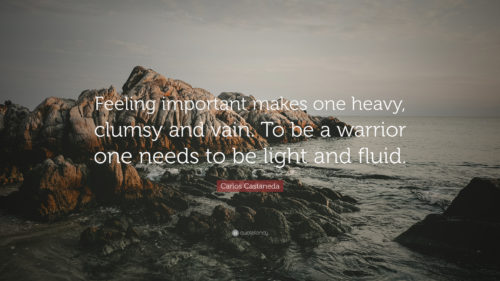
In our culture ruled by popularity and fame, a desire to feel important is something a lot of people feel at some point in their life. We can get over this need by addressing what’s causing us to crave attention and taking care of our deeper needs. (Estimated reading time: 6-7 minutes)
“Truly great people do not feel important, they make others feel important.”
— Mini Dama
A visit to a museum like the Louvre in Paris is the closest thing you can get to a time machine. Wandering from one gallery to the next gives you instant access to the majesty of human history.
Every painting, sculpture, and artifact tells a story about the people who created it. You get a glimpse into their lives, what they ate, how they traveled, and what they considered beautiful and of value.

After many hours of exploring the never-ending labyrinth of the Louvre, filled with some of the most exquisite antiquities and works of art in the world, I identified a common theme: artists and craftsmen used symbology to highlight the importance of those considered superior in the hierarchy of their particular era.
Kings, queens, nobility, army generals, and religious leaders were depicted with special ornaments, clothes, and accessories. Their appearance was further exalted by their setting—a grand courtroom, a magnificent boulevard, a beautiful cathedral or a lush garden.
In that moment, I had an epiphany. The desire to feel important is a need that humans have had since the dawn of civilization. The only thing that’s changed is the way we express and perceive that importance.
Today, the visual symbols of importance and power include designer clothes and accessories, fancy cars, physical perfection, and how we groom and present ourselves. In the world of social media, our importance is calibrated on the number of followers and ‘likes’ that we accumulate.
Even though this is a superficial yardstick to assess someone’s worth, it’s a clear indicator of our need to feel important. According to motivational expert and coach, Tony Robbins, the need to feel significant is one of the six primary human needs and is, therefore, natural to human nature.
We’re all wired to crave a sense of belonging and to be accepted by our peers. Being seen and recognized by others makes us feel safe on an instinctive level. Our caveman ancestors knew that if they were included in the pack, they would have enough food, shelter, and emotional support to live, and they wouldn’t have to worry about threats as much.
The question that we have to ask ourselves is this: at what point does this basic ‘need’ to belong and to be loved become an addictive and fear-based? At what point do we become a ‘hungry ghost‘ (a character from Buddhist iconography that suffers from greed, and jealousy), unable to take in what we desperately need because of our constrictions?
All the praise and adulation in the world won’t be enough to fulfill an unhealthy desire to feel important. Like a hungry ghost, an afflicted individual may wander aimlessly looking for something or someone to satisfy their insatiable hunger for significance.
Without our awareness, this vicious cycle of a desire to feel important can lead to a crippling state of disempowerment and cause emotional highs and lows.
Several causes produce this hole in the spirit of an individual. According to studies done by child psychologists, our need to feel important is determined by how our parents responded to our cries for attention when we were babies and children.
As little kids, we may have tried to all kinds of tactics to get our parents to acknowledge us. “Mommy, mommy what do you think of my drawing?” “Daddy, watch me twirl and sing!” If, for the most part, we didn’t get a response from mommy and daddy during our pleas for their attention, a void is formed within us which continues to grow, depending on how conscious we become of it as adults and make a conscious effort to heal it.
This void deepens if we surround ourselves with shallow individuals who are constantly in competition, trying to get a leg over. You’ll more likely be driven by the desire to feel important and will do whatever it takes to ‘keep up with the Joneses’.
If you allow yourself to get pulled into the illusory world of fame and celebrity, you’ll be trapped in a fantasy world where you believe that you’re a star without really earning it.
I remember watching an episode of the Dr. Phil show that featured a young man, in his early 20’s, who believed that he was going to be the next Jay Z. He refused to get a job and instead borrowed money from his mother (nearly bankrupting her in the process), to cut records and buy fancy equipment, props, and clothes to look the part. It was obvious that he was chasing the glamour and status that comes with being a star without putting in the hard work.
If you find yourself consumed by the desire to feel important, please don’t beat yourself up about it. It happens to the best of us. Here are some guidelines to help you move away from this unhealthy desire:
1. ‘Humble up’ by gaining perspective: Newer generations are being raised to believe that they’re special, giving them a false sense of entitlement. They start believing that the world owes them something. Although it’s important to pay attention to our needs and aspirations, expecting the world to revolve around them leads to nothing but disappointment. I learned the term ‘humble up’ from spiritual leader and author, Caroline Myss, who believes that grounding ourselves in humility is a key stepping-stone to flourishing spiritual life.
2. Dig deep and build inner strength: Find out what could be the driving force behind your need. It might help to work with a qualified therapist to discover the root cause, especially early life experiences that had an impact on you. Having clarity about your feelings will make it easier to heal and shift to healthier patterns of thinking that will be beneficial to your emotional wellbeing.
You can work on building your inner strength, and core foundation, by engaging in acts of self-care and acknowledging all your successes thus far. By giving yourself love and validation, you’ll be less likely to feel the impulse to get it from others.
3. Focus on progress and growth: Shift your focus from pleasing others to your inner world and the path ahead of you. Focus on doing your personal best, not to gain recognition from others. Listen to the wisdom of your inner voice when making decisions and only do what feels right for you – not because others expect you to do it. Be inspired by the vision that you have for your life and get fired up by goals that you set.
4. Make others feel important: Get over the desire to feel important by redirecting the spotlight from yourself, onto others. Get curious about anyone that you meet and instigate conversation by asking them plenty of thoughtful questions. Remember that you can learn something new from every single person that you meet if you’re open to it. Showing a sincere interest in others, and listening to what they have to say, is the most effective way to make a person feel important.
At the core of the need to feel important is the belief that love is a scarce resource, and that we must fight to get it. The truth is that love permeates every corner of our universe. We can engage with this loving energy by becoming a channel for it. When we’re willing to give it to others in a selfless way, we’ll discover that the love will mysteriously find its way back to us.
All my best on your journey,
Seline

Question: Do you find yourself being controlled by the desire to feel important? What steps are you willing to take to overcome this desire?
Did you like this post? Sign up below and I’ll send you more awesome posts like this every week.



Good comments and thoughts here Seline- thanks for sharing it with us!
I have a question though, what about a situation where your desire to feel important is based off a childhood where you were made to feel everything but important and now that you are an adult you crave that feeling and are willing to do almost anything to finally be seen as important and to feel important?
Im really struggling with this so any insight you have would be appreciated!
I feel your pain and suffering as well Alex.
Being raised by Indian parents, there was always a lot of pressure on me, even at a young age. Even now as an adult of almost 21 my mother and father still put a lot of pressure on me and I have a lot to try and live up to their expectations of me. It has been a challenge but I have come to live my life basically like this- I do what I want and feel lead to do and in that try to bring honor to my family. I did not go to medical school like they wanted but I am trying to be the best journalist that I can be. It’s not easy and they don’t always agree with me or I with them but we have found ways to agree to dissagree on some things.
Hopefully you can find what works for you!
I grew up with mixed messages from my parents. What I’ve come to learn is that, while it is wonderful to get nurturing from the outside, it’s really our job to love ourselves the way we crave to be loved. Cause guess what? We are with ourselves 100% of the time. Think about what you crave to have been told and start telling those things to yourself. Just like you would want to lift up a dear friend, let yourself be that dear friend as well.
Great article. I actually quit teaching dance which was my passion, because I had come to sense that I was going for significance. I decided I needed to find my worthiness just by being alive, doing ordinary things.
Then years later, as I was weeding the onions at the organic farm I ran, I had a new epiphany. That I really had a desire to play on a bigger stage of life. And whether that was “just” grandiosity or something else, on my death bed I would regret it if I didn’t try to expand into more of what I was capable of. It’s all interesting food for thought. Thank you for sharing yours.